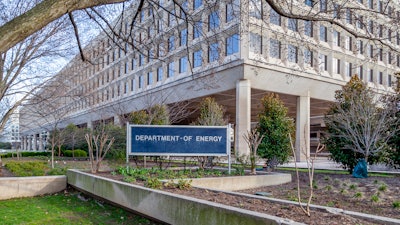
The U.S. Department of Energy announced $750 million for 52 projects across 24 states to reduce the cost of clean hydrogen. These projects, funded by the Bipartisan Infrastructure Law, are expected to help advance electrolysis technologies and improve manufacturing and recycling capabilities for clean hydrogen systems and components, directly supporting more than 1,500 new jobs.
The projects are expected to enable U.S. manufacturing capacity to produce 14 gigawatts of fuel cells per year, enough to power 15% of medium- and heavy-duty trucks sold each year and 10 gigawatts of electrolyzers per year, enough to produce an additional 1.3 million tons of clean hydrogen per year.
The DOE expects the investments to help achieve its Hydrogen Shot goal of reducing the cost of producing clean hydrogen to $1 per kilogram.
Managed by DOE’s Hydrogen and Fuel Cell Technologies Office (HFTO), these projects represent the first phase of implementation of two provisions of the Bipartisan Infrastructure Law, which authorizes $1 billion for research, development, demonstration and deployment (RDD&D) activities to reduce the cost of clean hydrogen produced via electrolysis and $500 million for research, development and demonstration (RD&D) of improved processes and technologies for manufacturing and recycling clean hydrogen systems and materials.
Selected projects will advance clean hydrogen technologies in the following areas:
- Low-Cost, High-Throughput Electrolyzer Manufacturing (8 projects, $316 million): Selected projects will conduct RD&D to enable greater economies of scale through manufacturing innovations, including automated manufacturing processes; design for processability and scale-up; quality control methods to maintain electrolyzer performance and durability; reduced critical mineral loadings and design for end-of-life recovery and recyclability.
- Electrolyzer Component and Supply Chain Development (10 projects, $81 million): Selected projects will support the U.S. supply chain manufacturing and development needs of key electrolyzer components, including catalysts, membranes and porous transport layers.
- Advanced Technology and Component Development (18 projects, $72 million): Selected projects will demonstrate novel materials, components and designs for electrolyzers that meet performance, lifetime and cost metrics—to enable cost reductions and mitigate supply chain risks. Longer-term cost reductions enabled by these cutting-edge projects are likely to play a significant role in achieving DOE’s Hydrogen Shot goal.
- Advanced Manufacturing of Fuel Cell Assemblies and Stacks (5 projects, $150 million): Selected projects will support high-throughput manufacturing of low-cost fuel cells in the United States by conducting RD&D that will enable diverse fuel cell manufacturer and supplier teams to flexibly address their greatest scale-up challenges and achieve economies of scale.
- Fuel Cell Supply Chain Development (10 projects, $82 million): Selected projects will conduct R&D to address critical deficiencies in the domestic supply chain for fuel cell materials and components and develop advanced technologies that reduce or eliminate the need for per- and polyfluoroalkyl substances (PFAS), often referred to as “forever chemicals.”
- Recovery and Recycling Consortium (1 project, $50 million): This funding establishes a consortium of industry, academia, and national labs to develop innovative and practical approaches to enable the recovery, recycling, and reuse of clean hydrogen materials and components. It will establish a blueprint across the industry for recycling, securing long-term supply chain security and environmental sustainability.
These investments, which amount to $1.6 billion in total (including recipient cost-sharing), will directly produce more than 1,500 new jobs, along with thousands of additional jobs indirectly generated through resulting economic activity. By supporting the expansion of domestic fuel cell manufacturing capacity to 14 gigawatts (GW) per year, these projects will help enable production of enough fuel cells to power 50,000 medium- and heavy-duty trucks annually—nearly 15% of yearly sales.
Similarly, by supporting domestic electrolyzer manufacturing, these projects are expected to enable production of up to 10 GW of electrolyzers per year, which is equivalent to adding 1.3 million metric tons to our annual clean hydrogen production capacity. Furthermore, by driving cost reductions for electrolyzers and fuel cells, these projects will improve the business case for the use of clean hydrogen in heavy duty transportation, industrial applications and as an energy storage medium, where it can help mitigate the impact of fluctuations in supply and demand and reduce strain on the electrical grid.






















